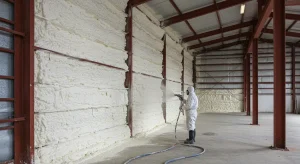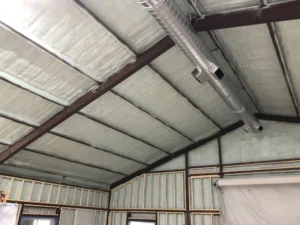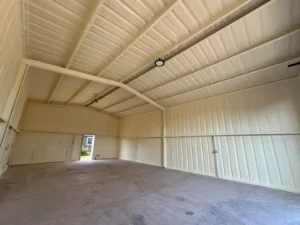Winter in Moore County can bring chilly temperatures and unpredictable weather. For local businesses, these conditions pose challenges that go beyond comfort, impacting energy costs, equipment performance, and even structural integrity. One essential measure to safeguard your business and maintain operational efficiency is proper commercial insulation. In this article, we explore the critical role of insulation in winterizing your business, how it works, and why investing in professional solutions can save you money and hassle.
Understanding the Role of Insulation in Winter Prepare
Effective insulation acts as a barrier, reducing heat transfer between your building and the outside environment. During winter, it minimizes heat loss, keeping indoor spaces warm and reducing the strain on heating systems. Proper insulation ensures consistent temperatures, improves energy efficiency, and lowers utility bills—key factors for businesses looking to maximize profitability.
How Insulation Works
Insulation materials trap air within their structure, slowing the movement of heat. Common types used in commercial applications include:
- Spray Foam Insulation: Expands to fill gaps, offering excellent sealing properties.
- Fiberglass Batts: A cost-effective choice for walls and ceilings.
- Rigid Foam Boards: Ideal for areas requiring high moisture resistance.
- Reflective Insulation: Designed to reflect radiant heat and work well in conjunction with other systems.
Each type has unique benefits, and the right choice depends on factors like building design, budget, and specific insulation goals.
Benefits of Insulating Your Business
Energy Efficiency
Insulated buildings retain heat better, leading to reduced reliance on HVAC systems. This efficiency translates into lower energy bills and a smaller carbon footprint, contributing to sustainability goals.
Protection Against Structural Damage
Winter conditions, such as frost and condensation, can cause moisture buildup within walls and ceilings. Proper insulation prevents this by maintaining internal temperatures and reducing the risk of mold growth, wood rot, and corrosion
Improved Comfort for Occupants
Whether you run a retail store, office, or warehouse, maintaining a comfortable environment is essential for staff productivity and customer satisfaction. Insulation helps stabilize indoor temperatures, ensuring a pleasant atmosphere even during the coldest months.
Long-Term Savings
Though insulation requires an upfront investment, the long-term savings on energy and maintenance costs make it a cost-effective solution. Additionally, well-insulated properties often command higher market values.
Key Areas to Insulate in Commercial Buildings
Walls and Ceilings
These surfaces account for significant heat loss. Insulating walls and ceilings effectively reduces temperature fluctuations and enhances overall thermal performance.
Roofs
Heat naturally rises, making roofs one of the most critical areas to insulate. Adding insulation here prevents heat escape and protects roofing materials from freeze-thaw cycles.
Floors
Uninsulated floors, especially those above unheated spaces like basements, can lead to substantial heat loss. Addressing this area improves indoor comfort and reduces heating demands.
Windows and Doors
While not insulation in the traditional sense, sealing gaps around windows and doors complements insulation efforts, reducing drafts and enhancing energy efficiency.
Choosing the Right Insulation Partner
Working with a professional spray foam insulation company ensures your project meets the highest standards. Flatland Roofing & Insulation, based in Moore County, offers expertise in commercial insulation tailored to local weather conditions. With advanced materials and techniques, we provide solutions that maximize efficiency and durability.
Why Choose Professional Installation?
- Precise Application: Professionals ensure even coverage and proper material placement for optimal performance.
- Code Compliance: Adherence to local building codes and safety standards.
- Time Efficiency: Swift project completion with minimal disruption to business operations.
- Long-Lasting Results: Quality materials and expert craftsmanship ensure insulation remains effective for years.
A Step Toward Greater Efficiency
Insulating your business is more than a seasonal preparation—it’s an investment in long-term efficiency and sustainability. Flatland Roofing & Insulation provides tailored solutions to meet your needs, ensuring your business stays warm and efficient throughout the winter. Contact us at (806) 606-6794 or info@flatlandroofcoatings.com to schedule a consultation today.
Conclusion
Winter-proofing your business through proper insulation is an essential step toward maintaining efficiency, protecting assets, and ensuring comfort during colder months. Flatland Insulation & Roofing is here to guide you through the process and deliver top-notch results. Contact us today at (806) 606-6794 or info@flatlandroofcoatings.com to get started.
Frequently Asked Questions
How much does commercial insulation cost?
Costs vary depending on the building size, insulation type, and project scope. A consultation with Flatland Roofing & Insulation can provide a detailed estimate.
How long does insulation installation take?
Most projects can be completed within a few days. The timeline depends on building complexity and the areas being insulated.
Can insulation be installed in an already-occupied building?
Yes, professional installers can work around your schedule to minimize disruption to your operations.
What are the maintenance requirements for insulation?
Insulation requires minimal maintenance. Regular inspections can help identify and address issues like moisture intrusion or material settling.
Is insulation environmentally friendly?
Many modern insulation materials are made from recycled or sustainable components and contribute to energy efficiency, reducing overall environmental impact.
How do I know if my building needs better insulation?
Signs include high energy bills, uneven indoor temperatures, drafts, and visible moisture issues. An energy audit can pinpoint specific areas for improvement.
Does insulation improve soundproofing?
Yes, many insulation types reduce noise transmission, creating a quieter indoor environment.
Can I combine insulation upgrades with other energy-efficient improvements?
Absolutely. Pairing insulation with efficient windows, doors, and HVAC systems maximizes overall energy performance.
What is the lifespan of commercial insulation?
Most insulation materials last 20–50 years, depending on the type and conditions.
Why should I hire a local insulation company?
Local companies, like Flatland Roofing & Insulation, understand regional weather patterns and building requirements, ensuring solutions that work for your specific needs.





